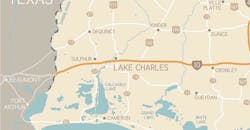Sasol Ltd., the world’s biggest maker of fuel from coal, said the cost of its giant Lake Charles chemicals project in Louisiana will balloon to as much as $12.9 billion, or about 50% more than initially planned.
The cost blowout is a further setback for the development that's part of the South African company's plan to expand internationally. It has already suffered a number of budget increases because of factors including weather delays. Sasol shares slumped the most in 20 years after the announcement on Wednesday.
“We’re extremely disappointed with the increase” in costs, co-Chief Executive Officer Bongani Nqwababa said on a conference call. The company said in a statement it’s taken measures since February to “further strengthen the oversight, leadership for the project and frequency of reporting,” and will accelerate a previously announced asset-sale program.
The Lake Charles Chemical Project -- dubbed LCCP -- will, once completed, boost the portion of chemicals in Sasol’s sales mix to 70%. It’s one of two massive plants originally planned in the U.S., but the second -- a gas-to-liquids project -- was abandoned during the oil-price crash. The chemical plant was approved in 2014.
Sasol on Wednesday announced a new cost range of $12.6 billion to $12.9 billion for the LCCP project, about $1 billion more than it forecast three months ago. Back in 2016, then-CEO David Constable had said an increase to $11 billion was a “worst-case scenario.” The company attributed the latest hike to a “correction for duplication of investment allowances,” higher contract expenses, unanticipated work and defective materials.
The shares tumbled as much as 15%, the biggest intraday decline since September 1998, and traded down 11% at 383.45 rand as of 12:19 p.m. in Johannesburg.
The cost increase is “illustrative of lackluster controls and oversight throughout the four to five years LCCP has been in design and construction,” said Wade Napier, an analyst at Avior Capital Markets in London. “Sasol needs to address its leadership and culture.”
The changes at the project, Sasol’s largest, won’t alter the company’s overall “capital-allocation strategy,” according to the statement. Sasol still plans to cut gearing -- or the ratio of debt to equity -- to about 30%, though the internal rate of return estimated for Lake Charles has now declined to as low as 6% from 7.5%, it said.
By Paul Burkhardt
About the Author
Bloomberg
Licensed content from Bloomberg, copyright 2016.
